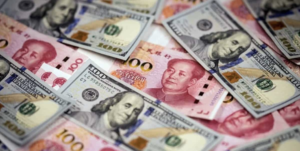This article was originally printed in EURObiz – Journal of the European Union Chamber of Commerce in China. Thank you to the author for his kind authorisation to republish.
Many foreign companies in China are struggling. Battered by the COVID-19 pandemic, an evolving political and economic environment, and under pressure from local rivals, Gabor Holch of Campanile Management Consulting argues that bosses need to change old patterns of thinking to thrive in a changed country.
Planners, supervisors and implementers of multinational strategies should not dream about ‘restoring’ their China operations. While everybody wants to erase the memories of COVID-19, China’s post-pandemic boom has not met expectations. But people should still feel optimistic about the country’s economic prospects.
However, leaders of multinational companies (MNCs) should tread extremely carefully in 2024. Disasters turn familiar terrain into minefields. They reset networks and hierarchies, and alter behaviour. Leaders must adapt to new circumstances to succeed, but there are limits to individual flexibility. Thus, collaboration is an essential survival skill during tough times. While multinational executives in China quickly spot post-crisis opportunities, they have been slower to realise the extent of the changes required in their own organisations to turn those opportunities into tangible business.
Everything has changed
The world has changed. But some changes are easier to overlook than others. A great example is the post- pandemic struggle to get people back to work. Pointing at productivity figures from before COVID-19 ignores simple realities. Many companies found that workers could be extremely productive when working from home, and young professionals who started work during the pandemic have no experience of operating in an office environment. New macroeconomic and geopolitical realities, investment and financing possibilities, consumer habits and priorities mean that fresh strategies are required. Agile industries like retail and services have adapted more easily, but firms in slow-moving sectors like energy and heavy manufacturing have struggled to find alternatives to pre-pandemic modes of operating.
China has changed. The China where foreign firms must now survive has also changed dramatically. Beyond pandemic-related turbulence, recent years have seen the country’s biggest political and economic reversal since the early 2000s, changing everything from government procurement to the fate of China’s top firms to citizens’ livelihoods. Predictable risks from things like demographic change, global warming and material shortages have combined with supply chain disruptions and China’s deteriorating reputation among top economies. Few foreign executives would have foreseen an even less predictable regulatory environment than five years ago.
The place of foreign companies in China has changed. The relative weight of foreign businesses operating in the country had already declined prior to the pandemic. Made in China 2025, shifting towards value-added economies and enhanced reliance on the so-called ‘global south’ were the beginning.
COVID-19 supercharged self-reliance efforts by a nation that felt unfairly blamed for the pandemic and saw immigration as both a health and ideological hazard. The resulting breach of trust between China and its top trading partners reversed key indicators of integration, including investment, foreign residents, visitors and participation in international cooperation programmes. Intensifying anti-corruption measures and national security campaigns further undermined trust between China and foreign nationals, both inside and outside of the country.
Succeeding in the new China
Executives remind themselves to stay positive in difficult times. China’s size, growth and potential all merit optimism, but a slowing and changing country in a slowing and changing world makes it harder to spot genuine opportunities. The speed and agility that today’s China requires are not typical strengths of MNCs: compliance, complexity and global standards curb flexibility. Responses to ‘decoupling’ serve as examples. Many firms responded with a new emphasis on ‘in China for China’ business models but soon realised their weaknesses. Access to global resources, including human resources, remains a core strength of successful multinationals in China. Foreign firms are still stronger in global markets than Chinese competitors. What can international firms do to realise China’s potential with more confidence?
Expat managers in China need new success manuals
One painful consequence of recent changes is the realisation that the hard-earned experience of senior expat executives loses value over time. Decades-long China expats might struggle to appreciate local technologies, new competitors and consumer trends. Not that they are wrong about everything: MNCs still make mistakes that seasoned China hands have long warned against. This contrast suggests that foreign firms must create strategies featuring synergies of foreign and local, old and new, courage and caution. The same is needed in their leadership teams.
Over two decades, foreign firms outgrew the pioneering spirit that was needed when China acceded to the World Trade Organization in 2001, and matured into steady and reliable operations. Defying predictions, China never replicated Western industrial models. Local firms graduated to competitors and domestic market leaders, but still prioritised risk- taking, speed and agility. As Cornell professor Jessica Chen Weiss wrote, foreigners cannot “out-China China” using local tactics: their success rests on competitive multinational advantages. Most of these advantages stem from a simple fact: global decision-makers are more exposed to information from China than Chinese ones to global data and know-how. That imbalance can translate into tangible advantages for foreign firms and help them play a pivotal role in China’s integration and development.
Multinationals can place their China operations into a wider strategic context and benefit not only financially but also in brand and relationship building. Smart executives already craft strategies that save them the inconvenience and risk of taking sides in painful geopolitical and economic confrontations. American and European automotive firms square the vicious circle of decoupling by intensifying their investment in China while simultaneously ‘friend shoring’ other operations for IP or supply chain concerns. Several top semiconductor and technology firms have built combined investment portfolios in China and Taiwan. Beyond balancing safety, innovation and scale, such strategies provide leaders with flexibility in public relations both in China and elsewhere.
Accessing know-how
Multinationals can gain further advantages by combining legacy values with local innovation. China-based expat executives may be frustrated by the quality and compliance standards of Western automotive or pharmaceutical firms, but those areas are exactly where MNCs still beat Chinese firms in global markets. The advantages of affordable cars or pills are immediate, while weaknesses tend to manifest over time and take longer to fix. By combining local and global know-how, foreign firms can borrow strengths from promising industries to boost struggling ones. Some firms already do that by upgrading reliable Western car brands with China- inspired digital technology, or by importing global marketing methods to support locally-produced and sold pharmaceuticals.
Finally, multinational firms have significant advantages when it comes to accessing talent from China and abroad. Although the lustre of working for a foreign company has faded in recent years, MNCs still attract Chinese candidates with outstanding language skills, education and overseas ambitions. Meanwhile, foreign firms have already nurtured a generation of Chinese-speaking expats and can access new talent abroad that local employers cannot. The pull of China’s national champion firms is strong, and considerable numbers of talented local and expat managers dream of working for them. But many return to MNCs after a few years due to difficulties with heavy workloads, overtime and challenging corporate cultures.
To maintain the advantages of a global strategic outlook, access to international know-how and future talent networks, foreign firms can also rotate their people between China, headquarters and nearby expat hubs like Singapore and Bangkok. Of course, crafting new China strategies requires surpassing both the early-2000s ‘China as an outpost’ mentality and recent China-for-China dreams.
Picture credits: freepik.com






Be First to Comment